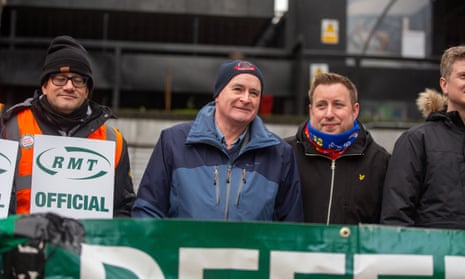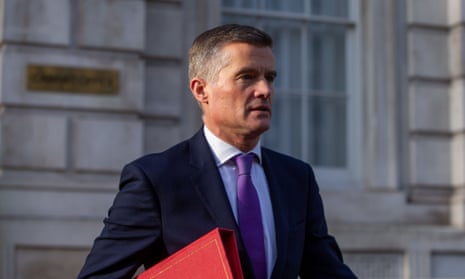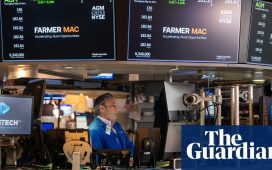Key events
Filters BETA
Mild weather sends gas prices lower

Alex Lawson
A spell of mild weather in the UK and Europe has sent wholesale gas prices tumbling in a respite from the high prices that have led to soaring energy bills.
European prices for delivery in February fell by 4.3% to €73.7 a megawatt hour while UK prices fell by 3.8% to 179p a therm.
Recent milder weather has reduced demand for heating in the UK and the rest of Europe and conditions are expected to remain mild for the next two weeks.
The situation has increased optimism over gas supplies, which have been stretched since Russia reduced gas exports to Europe after its invasion of Ukraine. Last week prices dipped to levels not experienced before the start of the war, in February 2022.
The RMT leader said he understands frustration over the strikes but advised disgruntled commuters to also “look at what the government and the companies are doing”.
Speaking from a picket line at London’s Euston station, Mick Lynch told PA that the rail companies cannot run services properly on non-strike days, let alone on days when industrial action is being taken.
Lynch said there was “very strong support” among the public for the walkouts but acknowledged not all people felt the same way.
We understand that anger and that frustration, and we understand why they might blame us, but they should also look at what the government and the companies are doing.
We want to get the railway back to normal. We want good industrial relations and we want the services to run the way they should be running.
The companies can’t run them on non-strike days, never mind when we’re out. So, we need to change the equation and get a settlement to the dispute as quickly as possible, and that will mean the public can rely on the railway and get the services they need.
RMT chief: Strikes to continue beyond May unless reasonable offer is made
The RMT general secretary, Mick Lynch, has said industrial action will need to continue beyond May unless a reasonable offer is made to the RMT.
They (the strikes) are likely to go ahead if there’s no offer that we can work on.
We would like to get into a situation where we’re negotiating constantly with the companies and where we didn’t have to have strike action, and then work up a settlement that our members could vote on and accept.
But if we don’t get that there will have to be more action, and we’ve got a mandate that runs through to May this year, and if we have to go further, that’s what we’ll need to do. We don’t want that, though.
As the first of five strikes began today, he added:
Our members are taking action right across the country, from the north of Scotland to the tip of Cornwall. The railway service has ground to a halt and it will be severely disrupted this week – we don’t take any pleasure in that.

Lynch also said that thousands of workers would have lost their jobs and safety would be endangered if the RMT accepted the latest offer from train companies.
Speaking from a picket line at Euston station in London, the union leader told PA:
The one on the train operating companies we could never accept, because that would mean thousands of our members and guards would lose their jobs, that would mean a less safe railway and it would also have meant we’d have to accept a pay offer that is way below last year’s inflation, and this year’s inflation, 2023.
We’ve also not had a pay rise in three years, so you’re looking at a three, four, five-year deal that would have been unacceptable to our members and unacceptable to the union, so it wasn’t a tangible offer that we could have gone forward with.
RMT boss: Ministers ‘enjoying the holidays’
A new wave of UK rail strikes began this morning, and the war of words between the government and unions heated up. While transport secretary Mark Harper said the union should return from the picket lines to the negotiating table to “hammer out a deal,” RMT chief Mick Lynch told the PA news agency:
I’ll come and meet the transport secretary whenever he wishes to – I could meet him in 20 minutes. If he wanted me to come off this picket line I would do that, so immediately.
What has happened is we had a meeting with the railway secretary on December 15, and we’d already given notice of action, and they’ve done nothing since that time, over Christmas, enjoying the holidays.
We were available to meet and they didn’t want to meet us. So they’ve waited until the strikes come to make these noises, but if they’d wanted to get a settlement and get the strikes off, they could have taken a bit more action and got things moving.
Huw Howells, head of manufacturing and industrials at Lloyds Bank corporate & institutional banking, said:
Manufacturers start 2023 on somewhat uncertain ground as December shows a fifth month of contraction.
There are silver linings in the supply chain, but unknowns remain for 2023, making forecasting difficult as manufacturers balance demand and supply.
Inflation remains high, and there’s concerns that further price increases may push down demand.
Manufacturers are making the most of an increased, though erratic, supply of semiconductors and the price of shipping containers returning close to pre-pandemic levels. Firms are also hoping China’s zero-Covid policy U-turn may smoothen supply out of the country.
The cost of energy remains a significant unknown with continued uncertainty over the government’s energy bill relief scheme once it ends in March.
UK manufacturing downturn worsens at end of 2022
Manufacturing in the UK ended 2022 on a weak footing, with production, new orders and employment all falling at faster rates.
The S&P Global / CIPS UK manufacturing purchasing managers’ Index fell to a 31-month low of 45.3 in December, down from 46.5 in November but above the earlier flash estimate of 44.7. It suggests the manufacturing has been declining for five months.
Excluding the lows registered during the first pandemic lockdown, the PMI reading is one of the weakest since mid-2009.
UK Final PMI manufacturing for Dec at 45.3 (EZ equivalent was 47.8 yday)- a significant drop in orders from overseas
Output has contracted at one of the fastest rates in 14 years
— Joumanna Nasr Bercetche 🇱🇧 (@CNBCJou) January 3, 2023
Shares, oil rise, while pound drops
On the markets, shares are pushing higher. The FTSE 100 index in London is 2.2% ahead at 7,613 on its first trading day of the year, touching its highest level since June, as energy stocks Shell and BP rose.
Germany’s Dax has gained 1.4% ahead of inflation data at lunchtime, France’s CAC is 1.3% ahead and Italy’s FTSE MiB has gained 1.5%.
Oil reversed earlier declines and is now trading higher, with Brent crude, the global benchmark, up 33 cents or 0.4% at $86.23 a barrel, while US light crude is 0.5% ahead at $80.64 a barrel.
The pound has lost 0.9% versus the dollar to $1.1934, but is up 0.1% against the euro at €1.1311.
Here is our full story on the Network Rail’s chief negotiator, Tim Shoveller, claiming that a deal to stop rail strikes is “in touching distance,” as drivers and staff staged a walkout on the first of five consecutive days of national rail strikes.
UK Transport secretary denies blocking a deal
The UK transport secretary, Mark Harper, has argued that the government is doing what it can to bring the rail dispute and strikes over pay, jobs and working conditions to an end.
He denied accusations by the RMT union that the government is blocking a deal between the unions and Network Rail and the train operators. He said a “fair and reasonable offer” was on the table, and that rail workers needed to accept changes to working conditions.
He told BBC radio 4’s Today programme that he had met with RMT leader Mick Lynch, who said on Monday that rather than “facilitating a deal,” the government was doing the opposite. Harper said:
I tried to change the tone of the discussions and I also made sure there was a new and improved pay offer that went to the trade unions, and two of the trade unions have accepted that offer on Network Rail. It’s disappointing the RMT recommended to its members that they not accept it and are continuing to have strikes.
And we had meetings, the rail minister met with the employers, the train operating companies and Network Rail, and the unions before Christmas. We’ve got more meetings scheduled next week and we’re very much trying to facilitate getting a settlement to this dispute rather than sitting on our hands.
He said the train operators had put a “fair and reasonable offer on the table”.
What they’ve got to do is thrash out with the trade unions reforms to the some of the outdated working practices. It’s perfectly reasonable that you get rid of some of the outdated practices so we can have people contracted to work on a Sunday so that we can have dependable services to rail users.
Asked whether the rail companies could offer more pay in return for such changes, or needed the government’s permission to do so, Harper said:
We’re not going to get those discussions to hammer out those reforms unless the trade unions get off the picket line and back around the table. But the offer that gets made to them…has to be fair to the taxpayer.
He reiterated:
There has to be a fair, balanced offer for taxpayers as well. There is not a bottomless pit of taxpayers’ money to throw at this problem. There is a fair and reasonable offer on the table that is comparable to the sort of pay deals that people are getting across the economy and we’ve got to have some reform in the industry.
He claimed he was “tough on both sides,” when asked why he was much tougher on the unions than the train operators, which made profits of £300m during the pandemic, with many running a poor service in recent months.

In the financial markets, Shore Capital analyst Peter Ashworth is cautiously optimistic for this year:
2022 ended with a whimper rather than the Santa rally we had hoped. The year-end reviews make dispiriting reading. The FTSE 100 ended up “flat” on the year, maintaining the rally seen since midOctober. In 2022, the market has absorbed nine increases in interest rates, inflation at 10.7%, (close to a 40-year high) and a 0.3% fall in GDP in Q3 22.
Against this backdrop, the outlook for 2023 looks better with interest rates peaking and inflation expected to be coming down. With undemanding valuations, we start the new year with a more upbeat view. One resolution we hope to keep.
Network Rail chief negotiator: Deal within ‘touching distance’
Tim Shoveller, chief negotiator for Network Rail, which maintains and runs the track, is optimistic that a deal can be achieved in the long-running rail dispute between unions led by RMT and Network Rail. He told BBC Radio 4’s Today programme:
What we’re saying to the RMT is we know which areas have been misunderstood by some of our staff, their members, and we want to make sure that we can work with the RMT now to make clarifications where there has been misunderstanding and put the deal out again.
We only need 2,000 people who voted ‘no’ last night to change their vote, and the deal will pass, so we think that’s within touching distance.
Meanwhile, RMT leader Mick Lynch, who is on a picket line at Euston station in London this morning, has again accused the government of blocking a deal.
Investors should brace for another turbulent year

Graeme Wearden
Investors should brace for another turbulent year in the financial markets, economists have warned as central banks fight inflation, China reopens its economy after Covid-19 restrictions and the Ukraine war pushes the global economy towards recession.
The first half of the new year is likely to be choppy, according to Wall Street predictions, after global markets suffered their biggest fall since the 2008 financial crisis last year.
But the US S&P 500 is still expected to end 2023 a little higher than it began the year. The average target of 22 strategists polled by Bloomberg has the S&P 500 ending 2023 at 4,078 points – about 6% higher than it ended 2022.
Economists predict the US Federal Reserve will slow its interest rate hikes this year, as the outlook for America’s economy sours. US inflation has dropped back from its peak last summer, while the series of Fed rate hikes in 2022 has also cooled the housing market.
“We believe that a period of sub-trend growth is inevitable, and recession risks are high as the lagged effects of tighter monetary policy work their way through the economy,” said Brian Rose, senior US economist at UBS Global Wealth Management.
Most UK train services out of action as five days of strikes begin

Gwyn Topham
UK rail strikes also continue, with tens of thousands of railway workers walking out today, as the row over pay, jobs and working conditions remains unresolved. Our transport correspondent Gwyn Topham reports:
The first of five consecutive days of national rail strikes have begun, closing much of Britain’s rail network and leaving only a skeleton service for commuters on urban and intercity lines.
Passengers were being urged to attempt to travel only if necessary, with about 20% of trains expected to run and scheduled hours of operation cut back to between 7.30am and 6.30pm.
Members of the Rail, Maritime and Transport union at Network Rail and 14 train operators are striking for two 48-hour periods, starting on Tuesday and again from Friday.
With signalling staff among the 40,000 RMT members on strike, much of the railway in Wales, Scotland and less populous regions of England will not run at all, while service frequencies will typically be reduced to one train an hour on major routes.
The latest action comes with no immediate resolution in sight to the long-running row over pay, jobs and working conditions on the railway. Unions claimed on Monday that rail companies were “in despair” over the government’s handling of the pay dispute, with the Treasury now effectively controlling what settlement can be made.
Mick Lynch, the RMT general secretary, said there had been “radio silence” from the government since a meeting in mid-December.
Introduction: China factory slide intensifies; economists say UK faces worst recession in G7
Good morning, and welcome to our rolling coverage of business, the financial markets and the world economy.
The New Year has started with a warning from the International Monetary Fund’s head, Kristalina Georgieva, that a third of the global economy will be in recession this year, and that 2023 is going to be tougher than last year. Economists are warning that the UK faces the worst and longest recession among G7 countries.
According to the Financial Times’s annual survey of leading UK-based economists (a poll of 101 analysts), a a clear majority said the inflationary shock caused by the Covid pandemic and Russia’s war in Ukraine would persist longer in the UK elsewhere, forcing the Bank of England to keep interest rates high and the government to run a tight fiscal ship. More than four-fifths expect the UK to lag other major economies, with the UK economy already shrinking.
John Philpott, an independent labour market economist, told the FT:
The 2023 recession will feel much worse than the economic impact of the pandemic.
In China, factory activity declined at a sharper pace in December as surging Covid infections disrupted production and held back demand, after Bejing removed most Covid restrictions, according to a survey.
The Caixin/Markit manufacturing purchasing managers’ index fell to 49 in December from 49.4 in November. It has been below the 50 mark that separates growth from contraction for five months. The reading was the lowest since September, but slightly better than expected. China’s larger official PMIM survey on Saturday showed a much sharper contraction, with the activity index falling to the lowest in nearly three years.
In the first week of the year, we will get the minutes of the last US Federal Reserve meeting (on Wednesday), US jobs data on Friday, and the Opec oil cartel will also meet.
Some Asian stock markets bounced back from earlier losses, with Hong Kong’s Hang Seng up 1.6% and the Shanghai Composite rising 0.9% while Japan was closed for a holiday. However, the Australian market lost 1.3% and the South Korean Kospi slipped 0.3%.
Naeem Aslam, chief market analyst at trading platform Ava Trade, says:
2023 has started with further escalation of tensions between Russia and Ukraine as a missile strike on a Russian military facility in the occupied territory in Ukraine killed 63 troops. This is more than likely to have an even more aggressive response from Russia. Overall, it doesn’t look like 2023 has started with a downshift in tensions between the two countries, and it is more than likely that the situation may actually become even worse after the current incident before becoming better.
The Agenda
-
8.55am GMT: Germany unemployment for December (forecast: 15,000, 5.6% rate)
-
9.30am GMT: UK S&P Global/CIPS Manufacturing PMI final for December (forecast: 44.7)
-
1pm GTM: Germany Inflation for December (forecast: 9.1%)
-
2.45pm GMT: US S&P Global Manufacturing PMI final for December










